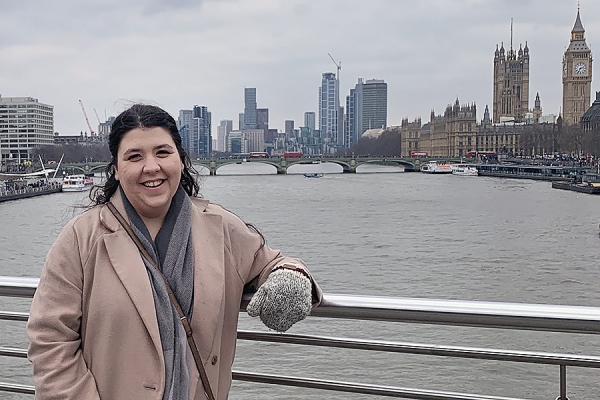 Her varied experiences at the University of Windsor led science grad Nadia Stephaniuk to teaching at King’s College in London, England.
Her varied experiences at the University of Windsor led science grad Nadia Stephaniuk to teaching at King’s College in London, England.
Nadia Stephaniuk (BSc 2017, MSc 2019) chose the University of Windsor specifically for its four-year Forensic Science undergraduate program, but she ended up on a serendipitous journey that led her to the United Kingdom.
Early on in Stephaniuk’s undergrad, she took on a part-time role as a campus tour guide for the enrolment management team, which led to her working in varying student recruitment capacities with developing leadership roles over the next nine years. Along the way she also discovered undergraduate research opportunities in a new discipline.
“In high school I was interested in the idea that you could use physical science and apply scientific knowledge and skills in the evidence, court, and crime scene realms,” says Stephaniuk.
In her second undergraduate year, Stephaniuk started volunteering in chemistry and biochemistry professor Jeremy Rawson’s lab.
“Volunteering escalated to a fourth-year thesis, opening my eyes to what research within academia looks like” she says. “From there, I stayed on to do to my master’s degree in chemistry with Dr. Rawson — it was a domino effect.”
After completing master’s studies, Stephaniuk was approached to design and teach an online chemistry course for upper-year forensic science majors.
“I was working full-time in recruitment when I began developing this new course, special topics in forensic chemistry. I was able to use my knowledge and experience from my degrees and research background to design a course from the ground up, with lectures, assessments, and tests,” she says.
“I then designed a secondary complimentary forensic chemistry course to my first one, adding an in-person lab component to the course. It was a phenomenal experience to be a part of this course design and implementation from the ground up.”
In addition to other commitments, Stephaniuk was heavily involved in science extracurriculars including tutoring, involvement in the Forensic Student Association, the graduate chemistry club, students offering support, and working with chemistry department head James Gauld to found a UWindsor chapter of Women in Chemistry.
All of these experiences culminated into her flying across the Atlantic Ocean in the summer of 2022 to work as a teaching fellow in forensic science and toxicology at King’s College London. She teaches in two MSc programs within the forensics department and delivers lectures in chemistry and forensic science, runs analytical laboratory sessions, provides mentorship to students, co-ordinates the logistics of a summer project term, and helps to co-supervise a few master’s students.
“I think it is entirely because of Science at UWindsor that I got the job at King’s,” says Stephaniuk.
“The combined degrees, plus research experience and involvement I was able to get within the university: I feel like everything combined allowed me to be here.”
Stephaniuk took it upon herself to revamp the established forensic science and chemistry courses she teaches to masters’ students in the U.K. by introducing new experiments and lectures to her courses, incorporating her teaching and education experience from Windsor into her current post.
“It keeps me busy, on my toes — that is something I picked up at UWindsor because I was involved in science and recruitment simultaneously for nine years, so I’m used to always having many things on the go.”
—Sara Elliott
Because of Science at UWindsor is a series designed to showcase Faculty of Science alumni and the impact of their journey through science.
